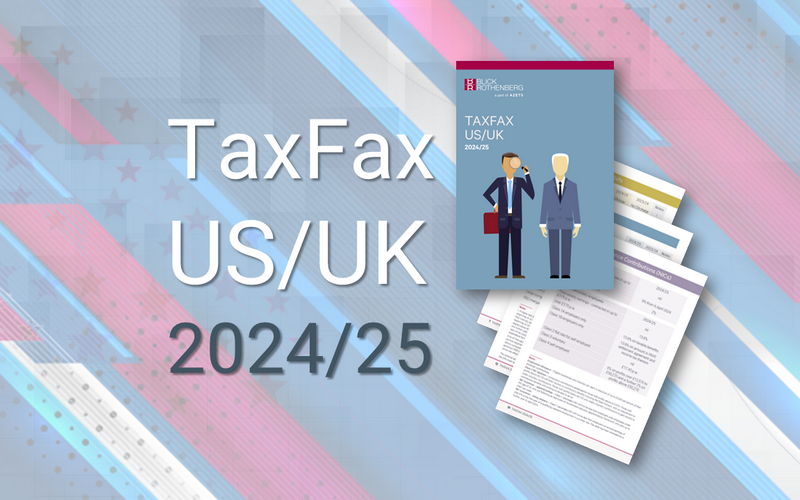
US Insights
Everything you need to know about the One Big Beautiful Bill
On 4 July, President Trump signed into law the One Big Beautiful Bill Act (OBBB), the cornerstone of his second-term tax agenda
While it extends many provisions from his first term, the final package reflects the reality of a slim congressional majority, intra-party negotiations, and the need to reconcile political promises with fiscal constraints.
For US taxpayers, particularly those based overseas, the Act delivers both certainty in some areas and complexity in others. Here’s what you need to know.
Key Highlights
Tax Rates and Inflationary Drag
Corporate Tax: The flat 21% federal rate for corporations remains in place and is now permanent.
Individual Tax: Marginal tax rates up to 37% are also made permanent, but inflationary adjustments will only apply to the 10%, 12%, and 22% brackets. Higher brackets will remain static, resulting in fiscal drag as incomes rise – something familiar to UK taxpayers.
Passthrough Deduction: The deduction for qualifying passthrough income (Section 199A) has been permanently extended.
Asset Expensing: Corporate deductions for capital expenditure are enhanced, a boost for domestic investment.
Deductions and Reliefs
A long-promised deduction for tips and overtime has been introduced but is phased out for higher earners, limiting its relevance for expatriates.
Personal exemptions are permanently removed, except for seniors (with a phase-out over $75,000 income).
The standard deduction increases from $12,000 to $16,000, with a new $1,000 charitable deduction available to non-itemisers.
The contentious State and Local Tax (SALT) deduction cap has been temporarily increased from $10,000 to $40,000 but is phased out at higher income levels and set to revert in 2030.
Estate and Gift Tax Certainty
A key area of concern for many high-net-worth individuals has been the sunset of the enhanced estate and gift tax exemption in 2025. The OBBB provides welcome certainty, setting a permanent exemption of $15 million per person from 2026, indexed annually. This change enables long-term planning without the looming threat of reversion.
International Tax Measures
The “Revenge Tax” and Remittances
The widely reported “Revenge Tax”, which would have targeted non-US taxpayers from jurisdictions deemed to impose “unfair foreign taxes”, was ultimately scrapped after resistance from international partners, including the G7.
A new 1% remittance excise tax applies to certain cash transfers from the US to foreign recipients, unless routed through US banks or card providers. The tax is narrow in scope and unlikely to impact most clients, although remittance providers must navigate new compliance obligations, including quarterly reporting and anti-conduit rules.
Goodbye GILTI, Hello NCTI
The GILTI regime, first introduced in 2018, will be replaced in 2026 with Net CFC Tested Income (NCTI). The core principles remain, but with:
- Higher tax exposure, through reduced offsets for foreign taxes
- A revised calculation for CFC income
- The rollback of 2018 attribution rules, which had unintentionally captured many overseas corporate structures
These changes may offer relief for some multinational structures while tightening tax outcomes for others. The need to revisit CFC exposure is clear.
What Else Is In the Bill?
Beyond tax, OBBB is a sweeping legislative package. It includes:
- Defence spending increases (including a new missile defence system)
- Accelerated phase-out of renewable energy credits
- Cuts to Medicaid
- Introduction of “Trump Savings Accounts”
- Funding for infrastructure, including spaceports and fisheries
Looking Ahead
While the OBBB introduces permanence in key tax areas, complexities remain – especially for international taxpayers balancing foreign and US tax systems. Planning opportunities are now available, particularly in the estate and business structuring space, but careful navigation is essential.
Want to Know More?
If you have any questions about how the US tax reforms may impact you or your business, please get in touch with your usual Blick Rothenberg contact or use the form below.
Personal tax is one of the most complex areas of wealth management and can significantly erode your wealth over time
Blick Rothenberg is considered to be market leaders in the taxation of non-UK domiciled individuals and offshore trusts, as well as cross-border personal taxation.
We have a strong base of clients in the UK and a broad and longstanding international focus too, acting for a large number of non-UK domiciled individuals and international families. So, we understand the complexities that US citizens face when living, working and operating businesses in the UK.
Whether you are a start-up entrepreneur, a wealthy family with complex affairs, or a business executive, our dual-qualified team of tax advisers will look after your US UK personal tax affairs as well as those of your business.
If you wish us to contact you or want to discuss your situation please complete the form on this page and one of our team will be in touch.
















